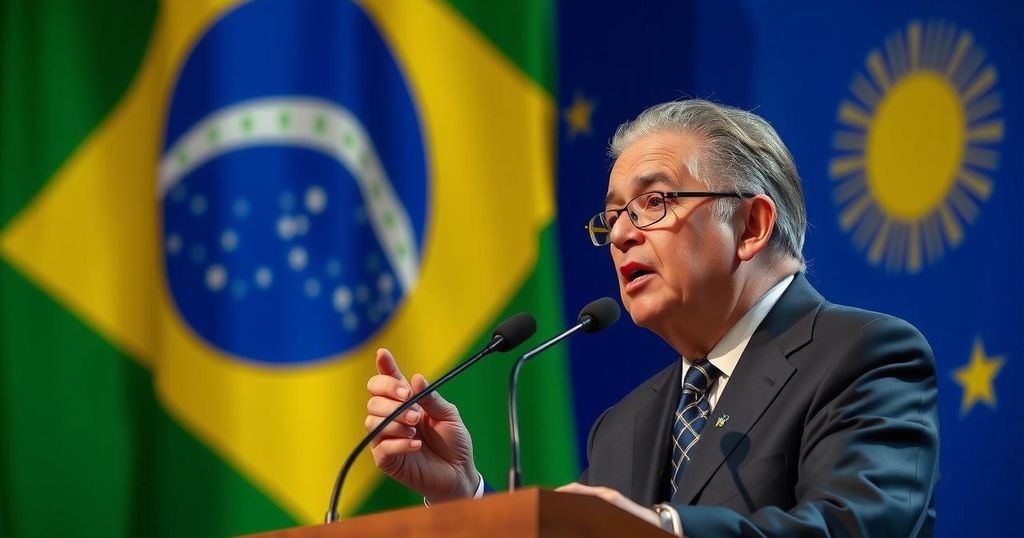Politics
AFP, ARGENTINA, ASIA, AZERBAIJAN, BRAZIL, BRAZILIAN FOREIGN MINISTRY, EUROPE, EUROPEAN UNION, FOREIGN MINISTRY, GUT, INTERNATIONAL RELATIONS, JAMES BAYS, LU, LUIZ INACIO LULA DA SILVA, LULA, MIDDLE EAST, MILITARY COUP, MUSEUM OF MODERN ART, NORTH AMERICA, REGIONAL COOPERATION, RIO DE JANEIRO, SOUTH AMERICA, SUPREME COURT, TRADE RELATIONS, UKRAINE, UN, UNITED STATES
Dante Raeburn
Lula Launches Global Anti-Poverty Initiative at G20 Summit in Brazil
Brazilian President Lula launched an anti-poverty and hunger initiative at the G20 Summit in Rio de Janeiro, gaining support from 81 countries, including 18 G20 nations. Amid escalating geopolitical tensions and climate change discussions, President Biden announced a significant policy shift regarding Ukraine. The summit also saw China propose a technological collaboration focused on the Global South.
Brazilian President Luiz Inacio Lula da Silva has inaugurated the G20 Summit in Rio de Janeiro with a significant global initiative aimed at addressing the interconnected issues of poverty and hunger. In his opening remarks, President Lula asserted that these challenges largely arise from political decisions and highlighted the urgent necessity for world leaders to confront climate change. His call to action emphasized the detrimental consequences of inaction and the need for collaborative global solutions. The anti-poverty initiative has garnered the support of 81 nations, comprising 18 G20 member states, the European Union, and the African Union. Argentina, under the leadership of far-right President Javier Milei, remains the only G20 nation not to endorse the initiative. Reports indicate that discussions surrounding the draft summit communique may be contentious, as certain nations are considering revisions on sensitive topics such as ongoing wars and climate issues. Amidst the backdrop of geopolitical tensions from conflicts in the Middle East and Ukraine, the summit aims to address pressing global challenges. Observers note that while Ukraine is excluded from the formal agenda, it is expected to loom large within informal discussions. Notably absent from the proceedings is Russian President Vladimir Putin, who declined to attend due to an international arrest warrant from the International Criminal Court concerning alleged war crimes; he is represented by Foreign Minister Sergey Lavrov. Furthermore, United States President Joe Biden, attending the summit for the final time, has shifted policy by permitting Ukraine to utilize long-range US missiles against Russian targets, a development which could provoke shifts in European allies’ stances. Alongside these political discussions, climate issues remain at the forefront, with leaders facing mounting pressure to assist in resolving the stalled COP29 climate negotiations in Azerbaijan. The conference has encountered impediments regarding climate financing necessary for developing nations, reinforcing the G20’s vital role in fostering international collaboration. Securing the event is paramount, particularly following recent threats that have targeted Brazil’s Supreme Court, highlighting ongoing security concerns. Additionally, Chinese President Xi Jinping has announced a collaborative initiative with Brazil, South Africa, and the African Union aimed at leveraging technological advancements for the Global South, marking a strategic response to restrictions imposed by the US on advanced technology exports to China.
The G20 Summit represents a major platform for the world’s largest economies to address global issues, including economic stability, trade, and social challenges such as poverty and hunger. Historically, the G20 has also acted as a forum for discussing pressing geopolitical matters and the consequences of climate change. President Lula’s emphasis on these issues underscores his administration’s focus on social equality and climate action, which are critical components of Brazil’s domestic and foreign policy agendas.
The G20 Summit convened in Brazil under President Lula’s leadership has emerged as a pivotal event focusing on the alarmingly high rates of poverty and hunger exacerbated by political choices and climate change. The broad coalition of countries supporting the initiative illustrates a collective commitment to confronting these challenges. However, the complex backdrop of international tensions and unresolved climate negotiations underscores the urgent need for collaborative action among global leaders to foster a fairer, more sustainable future.
Original Source: www.aljazeera.com








Post Comment